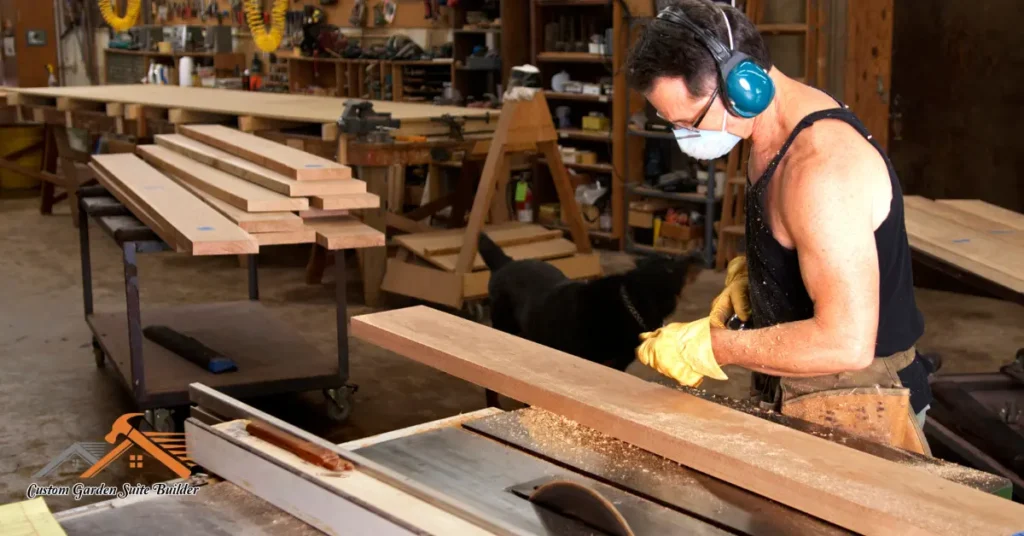Introduction – Custom Garden Suite in Toronto
Custom Garden Suite in Toronto – As housing prices continue to rise in Toronto, homeowners are exploring innovative ways to maximize their property’s potential. One solution gaining traction is the construction of custom garden suites—a secondary housing unit built in the backyard of an existing home.
A garden suite can provide additional rental income, serve as a multigenerational living space, or even act as a guest house. However, designing and building a garden suite requires careful planning, adherence to city regulations, and an understanding of costs.
In this detailed guide, we’ll walk you through the step-by-step process of designing and building a garden suite in Toronto—from feasibility assessments to final inspections.
Explore the latest pre-construction developments in Canada with detailed listings and insights.
Step 1: Understanding the Benefits of a Custom Garden Suite
Before diving into the design and building process, it’s essential to understand why a custom garden suite is a valuable investment.
1.1 Rental Income
With Toronto’s competitive rental market, a garden suite can generate a steady stream of passive income. Whether you rent it out long-term or list it on short-term rental platforms, it’s a great way to offset your mortgage costs.
1.2 Multigenerational Living
Garden suites offer a practical solution for families who want to accommodate aging parents or young adults seeking independent living without leaving the family property.
Find exceptional real estate opportunities in Canada, including homes and condos.
1.3 Increase in Property Value
A well-designed garden suite can significantly boost the value of your property, making it more attractive to future buyers.
1.4 Housing Crisis Solution
Toronto’s housing shortage has made it difficult for residents to find affordable accommodations. By adding a secondary dwelling unit, you contribute to the city’s housing supply.
Stay updated on the pre-construction real estate market by reading expert blogs.
Step 2: Determining Feasibility
Before moving forward, you must evaluate whether your property is suitable for a garden suite.
2.1 Zoning Regulations
The City of Toronto has set zoning bylaws that dictate where garden suites can be built. Some key regulations include:
-
The property must have sufficient backyard space to accommodate a garden suite.
-
The suite must be a certain distance from the main house and property lines.
-
Height and size restrictions apply.
-
Access for emergency services must be available (such as a pathway from the front yard to the backyard).
Get the latest trends and updates on Toronto real estate by reading articles.
2.2 Site Inspection
Hiring a garden suite expert or builder can help assess your property’s feasibility. They’ll examine factors like land slope, tree coverage, utility connections, and potential obstacles.
Discover investment potential in the 28 Bobmar Road Garden Suite, a promising project in Scarborough.
Step 3: Designing Your Custom Garden Suite
Once feasibility is established, the next step is to design your custom garden suite.
3.1 Choosing the Right Layout
Consider the following when designing your suite:
-
Size: Will it be a studio, one-bedroom, or two-bedroom unit?
-
Functionality: Should it have a home office, storage, or extra living space?
-
Open Concept vs. Traditional Layout: Open-concept designs maximize space, while traditional layouts offer more privacy.
Learn more about the Bobmar Road real estate market, including upcoming developments.
3.2 Architectural Plans
You’ll need to work with an architect or designer to draft the official floor plan and ensure compliance with zoning regulations.
3.3 Sustainability & Energy Efficiency
To make your garden suite eco-friendly, consider:
-
Solar panels for renewable energy.
-
Energy-efficient insulation to reduce heating and cooling costs.
-
Rainwater collection systems for irrigation.
-
Smart home technology to optimize electricity and water usage.
Find out how custom garden suites in Toronto can add value to your property.
Step 4: Obtaining Permits and Approvals
4.1 Building Permits
Before construction begins, you must obtain a building permit from the City of Toronto. The permit process includes:
-
Submitting architectural drawings and property surveys.
-
Ensuring compliance with fire safety and accessibility rules.
-
Meeting setback and height restrictions for secondary dwellings.
Browse a wide selection of Toronto homes for sale, including condos and townhouses.
4.2 Utility Connections
Your garden suite will require plumbing, electricity, and gas connections. Some properties may need upgrades to accommodate the additional load.
Invest in pre-construction properties in Toronto, a thriving real estate market.
Step 5: Hiring a Builder and Starting Construction
5.1 Choosing a Reputable Builder
Selecting a licensed contractor with experience in garden suites is crucial for a smooth building process. Look for:
-
Experience in secondary dwelling construction.
-
Good reviews and recommendations.
-
A portfolio of past projects.
5.2 Construction Process
-
Site Preparation: Clearing the backyard and leveling the land.
-
Foundation Work: Installing a strong base to support the unit.
-
Framing & Structure: Erecting walls, windows, and doors.
-
Roofing & Insulation: Ensuring protection from Toronto’s harsh winters.
-
Interior Finishing: Installing flooring, cabinetry, and appliances.
Construction timelines vary but typically range from 4 to 8 months depending on complexity.
Boost your brand visibility with professional Toronto Real Estate Photography.
Step 6: Final Inspections and Occupancy Approval
Once construction is complete, the city will conduct final inspections to ensure the suite meets all safety and zoning requirements. Once approved, you’ll receive an occupancy permit allowing you to rent out or use the space.
Finding the right custom home builders in Toronto is essential for creating a personalized living space that meets your unique needs and style.
Step 7: Cost Breakdown of a Garden Suite in Toronto
The cost of building a custom garden suite depends on various factors, including size, materials, labor, and permits.
| Cost Factor | Estimated Price Range |
|---|---|
| Architectural Plans | $10,000 – $20,000 |
| Permits & Legal Fees | $5,000 – $15,000 |
| Construction & Materials | $150,000 – $300,000 |
| Utility Hookups & Landscaping | $20,000 – $50,000 |
| Total Estimated Cost | $200,000 – $400,000 |
While the upfront investment is significant, rental income and property value appreciation make it a worthwhile long-term investment.
Improve your website rankings with expert SEO and digital marketing solutions.
Step 8: Financing Your Garden Suite
There are multiple ways to finance your custom garden suite:
-
Home Equity Loans: Borrow against your home’s equity.
-
Personal Savings: Use cash to avoid interest payments.
-
Rental Income Strategy: Plan to rent it out to recover costs over time.
-
Government Grants: Look for affordable housing incentives.
Check out this stunning Toronto condo listing at 401-1 195 McCaul St, featuring modern amenities and prime location.
Conclusion: Is a Garden Suite Right for You?
Building a custom garden suite in Toronto is an excellent way to:
✅ Generate rental income
✅ Accommodate family members
✅ Increase property value
✅ Contribute to affordable housing solutions
If you’re considering a custom garden suite, consult with expert builders and architects to bring your vision to life.
Get Started Today!
Ready to explore the possibilities of building a custom garden suite in Toronto? Contact us today for a consultation and start designing your perfect backyard home!

